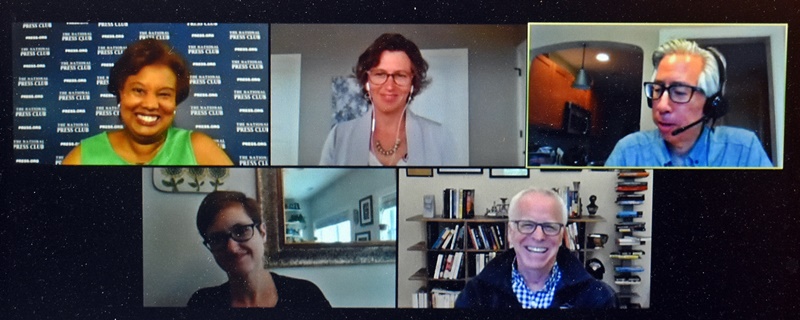New research gives journalists fresh insights for rebuilding public trust
New research from the Media Insight Project that sought to understand what underpins mistrust in media found journalists and the public aren't on the same page when it comes to the fundamental principles of journalism.
Gallup's annual Governance poll, conducted in September and August 2020, found that 60 percent of Americans have "not very much" or no trust in the media to report the news "fully, accurately, and fairly." Republicans are far less trusting of news than Democrats, and marginalized communities have long mistrusted the media because they didn’t see their experiences represented on the front page or on the evening news.
Representatives from the project — a collaboration among the American Press Institute (API), the Associated Press, and NORC — joined a National Press Club Headliners and Journalism Institute event Tuesday, May 25, to discuss to discuss what their research discovered about that mistrust. Lisa Matthews, assignment manager of U.S. video for the AP and the 114th president of the National Press Club, moderated the program.

The Media Insight Project looked at whether the public supports "what journalists see as their fundamental mission," said Tom Rosenstiel, executive director of API.
“Maybe the suspicion over journalism values — over what it is we think we should be doing as journalists — is a key component of the trust problem," he said.
The Media Insight Project measured support for these five journalism values:
-
Oversight: A journalist’s job is to act as a watchdog
-
Transparency: Society is better if things are out in the open
-
Factualism: The more facts people have, the closer they will get to the truth
-
Giving voice to the less powerful: Amplify the voices of people who aren’t ordinarily heard
-
Social criticism: Spotlighting problems helps society solve them
While journalists may consider these five journalism values universal, non-journalists do not.
Jennifer Benz, vice president, NORC at the University of Chicago, said the project found that just 11% of the public supported all five of these core journalism values without any reservation.
“It’s not a tale of complete support or opposition to each value based on somebody’s political identification or ideology, there’s a lot more nuance with moral values and they go beyond what we can learn from some simple measures of partisanship,” Benz said.
Many journalists assume that the public supports and understands the journalistic mission, said Tom Huang, assistant managing editor for journalism initiatives at The Dallas Morning News.
“Journalists are a different breed,” Huang said. “We really hold the watchdog role and accountability as our top value."
To close the trust gap between journalists and the public, the media must engage with the community, Huang said.
"It’s not just thinking of stories as, we do it, and we’re done," he said. "Create a conversation around it. Hold virtual and in person events when it’s safe to do that around some of these topics. Hold listening sessions in diverse communities.”
That engagement can help journalists understand what the community values, Emily Swanson, director of public opinion research for AP, said.
“I think that is also really important for us to be aware that no matter what stories we’re telling, we are keying on values,” Swanson said. “There’s no world in which journalism is... just purely a list of facts that isn’t trying to key on values. So, knowing what values the full community holds is really important and really important to understanding the audiences that we speak to.”
Ensuring diversity in the newsroom and diversity in news coverage is critical to restoring trust, Rosenstiel said.
“Many people — not just conservatives — do not see themselves in the news,” Rosenstiel said. “And that’s because, in many ways, the press is a tribe: We work together. We are friends together. We think alike. We reinforce each other’s values. … You cannot begin to understand and think and empathize with the community that you serve, unless you’ve got people who are from diverse communities.”
The panelists also suggested journalists consider the different “stakeholders” in a story and expand the kinds of experts to talk to, "pre-edit" a story before the reporting to determine who is affected and what questions need to be asked, and implement reader advisory panels or seek out non-journalists in the newsroom to give feedback about stories.
“We believe that this work opens up a new window into understanding the trust crisis that threatens the future of journalism,” Rosenstiel said. “Journalism exists to create a common set of facts and a public square. And if half of America is not in that square, that’s a threat to democracy.”
